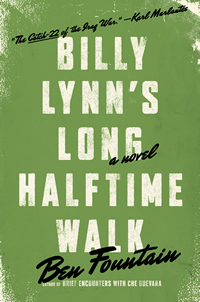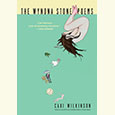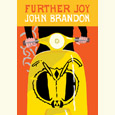Goodbye, Good Luck, I Love You All
With Billy Lynn’s Long Halftime Walk, Ben Fountain delivers the Iraq War novel the literary world has been waiting for
“I don’t know, Sergeant. It seems sort of weird, having a girl play a guy.” Inside Texas Stadium, awaiting the beginning of the Dallas Cowboys’ annual Thanksgiving Day game, nineteen-year-old Billy Lynn has just learned that Hilary Swank might be playing him in the film version of the battle that has made him the Iraq War’s Hero of the Month. “But Billy,” Sergeant Dime replies, “haven’t you heard, weird is the new normal.” As trite as it may seem, weird might be the best word to describe Billy Lynn’s experience on the day he and his fellow Bravos are celebrated in the midst of the garish excess of professional football. It hardly does justice, however, to Billy Lynn’s Long Halftime Walk, Ben Fountain’s debut novel, in which a squad of reluctant war heroes, a film producer, a gaggle of oil millionaires, several dozen sex-charged cheerleaders, immaculately groomed deal-makers, ‘roid-raging athletes, and Beyoncé all converge in a tour de force that is at once a tender character study and a scathing satire of our national state of oblivion.
The men of Bravo are at the end of a two-week “Victory Tour” designed to restore flagging support for the war. What more spectacularly American setting for staged nationality could a satirist conceive than a professional football game in a two-billion-dollar Texas stadium on Thanksgiving Day? “This is the undeniable big-time, there is no greater sports event in the world today and Bravo is smack in the frothy middle of it,” Fountain writes. “In two days they will redeploy for Iraq and the remaining eleven months of their extended tour, but for now they are deep within the sheltering womb of all things American—football, Thanksgiving, television, about eight different kinds of police and security personnel, plus three hundred million well-wishing fellow citizens. Or, as one trembly old guy in Cleveland put it, ‘Yew ARE America.’”
 This author’s intentions are far from subtle. He is going for broke here, bringing together a variety of pressing contemporary themes in a story that is as emotionally stirring as it is both chastening and bizarrely funny. With Billy Lynn’s Long Halftime Walk, Ben Fountain has produced what may eventually stand as the definitive American Iraq War novel.
This author’s intentions are far from subtle. He is going for broke here, bringing together a variety of pressing contemporary themes in a story that is as emotionally stirring as it is both chastening and bizarrely funny. With Billy Lynn’s Long Halftime Walk, Ben Fountain has produced what may eventually stand as the definitive American Iraq War novel.
The novel’s conceit was inspired by Fountain’s experience of watching an actual Thanksgiving Day half-time show at Texas Stadium on television and noticing a group of active-duty soldiers on the field. They were standing in the midst of “this surreal and patently mash-up of militarism, pop culture, American triumphalism and soft-core porn,” Fountain recently told The Huffington Post. Billy Lynn’s fictional act of heroism recalls the actual heroism of Salvatore Giunta, the first living recipient of the Medal of Honor since the Vietnam War. In the midst of a Taliban ambush in Afghanistan’s Korengal Valley, Giunta ran directly into the line of fire to rescue a comrade being dragged away by the enemy. Fountain transforms these raw elements into a searing and surreal trip through the turbulent emotions of a teenage grunt with a good heart and a mind full of questions. Billy tries to reconcile the absurdity of being glad-handed by Texan oil millionaires in ten-gallon hats only two weeks after losing his best friend in a firefight and only a few hours before he and the other surviving members of Bravo squad will be sent back to Iraq.
Billy doesn’t feel like a hero, which makes him all the more disoriented by the adulation he receives from “this pack of half-rich lawyers, dentists, soccer moms, and corporate VPs.” Though only nineteen, Billy’s war experience has given him an entirely understandable and convincing perspective on the central problem of a war the public deeply wants but is intrinsically incapable of understanding from the other side of the planet. “Americans fight the war daily in their strenuous inner lives,” Billy muses. “They want autographs. They want cell phone snaps. They say thank you over and over and with growing fervor, they know they’re being good when they thank the troops and their eyes shimmer with love for themselves and this tangible proof of their goodness.”
 The novel’s rapid-fire, swirling stream of consciousness enables Fountain to manipulate with deftness the chronology of his narration as he moves the camera of Billy’s mind’s eye through a variety of set pieces. As Thanksgiving Day unfolds in the stadium, Billy reflects on a simultaneously touching and troubling two-day leave at home with his bitterly partisan, Fox News-addicted father, his long-suffering mother, and his beloved sister, who argues passionately against his return to risk yet again an early and unnecessary death. Begging him to go AWOL, she reveals a plan she has worked out for his escape, and the novel’s chief source of suspense is the question of whether Billy will agree.
The novel’s rapid-fire, swirling stream of consciousness enables Fountain to manipulate with deftness the chronology of his narration as he moves the camera of Billy’s mind’s eye through a variety of set pieces. As Thanksgiving Day unfolds in the stadium, Billy reflects on a simultaneously touching and troubling two-day leave at home with his bitterly partisan, Fox News-addicted father, his long-suffering mother, and his beloved sister, who argues passionately against his return to risk yet again an early and unnecessary death. Begging him to go AWOL, she reveals a plan she has worked out for his escape, and the novel’s chief source of suspense is the question of whether Billy will agree.
Meanwhile, a meet-and-greet with the Dallas Cowboys Cheerleaders evolves into an utterly improbable but somehow credible love-at-first-sight wish-fulfillment fantasy. A last-ditch effort to sell Bravo’s story to Hollywood before the squad re-deploys to Iraq sharply satirizes the cynical dealings of multi-millionaire power brokers. A pre-game visit to the locker room puts the humble and chastened real-life soldiers in close contact with the over-pumped “gladiators” of professional football, including a few who offer—in all seriousness—to “ride wit yall for a week, couple weeks,” and “you know, cap some Muslim freaks.” As the action reaches a fever pitch of insanity, Billy and the Bravo boys find themselves on stage within mere feet of Beyoncé Knowles and Destiny’s Child in a perversely ecstatic fusion of martial bombast and sexual bravado reminiscent of the Playboy Bunnies scene in Apocalypse Now.
Fountain did not publish his first book, the PEN/Faulkner award-winning Brief Encounters with Che Guevara (2007), until he was forty-eight years old. With that one collection of short stories, he instantly garnered a reputation for fearlessness and ambition. In a 2008 New Yorker profile titled “Late Bloomers,” Malcolm Gladwell went so far as to hail Fountain a genius. Billy Lynn’s Brief Half-Time Walk will only reinforce the widely held belief that Malcolm Gladwell is never wrong. Even when he overreaches, Fountain’s energetic and urgent style is irresistibly engaging. The novel’s few shortcomings evoke admiration for their sheer audacity.
Most significantly, in Billy Lynn, Fountain renders a persuasive and endearing portrait of how a regular kid who plays video games and watches porn and has no real vision or concept of adulthood can be transformed by a tragic circumstance into a hero, and, more tellingly, a wizened truth teller—a man worthy of our admiration for much more than combat valor. “He can feel it rising in him, this powerful if not quite choate sense of how to live a strong and decent life,” Fountain writes. “So he suspects at least. That’s his sense of it. He would like the chance to find out, anyway.”
[This review originally appeared on May 16, 2012.]
Ben Fountain will discuss Billy Lynn’s Long Halftime Walk at the twenty-fourth annual Southern Festival of Books, held October 12-14 at Legislative Plaza in Nashville. All events are free and open to the public.


